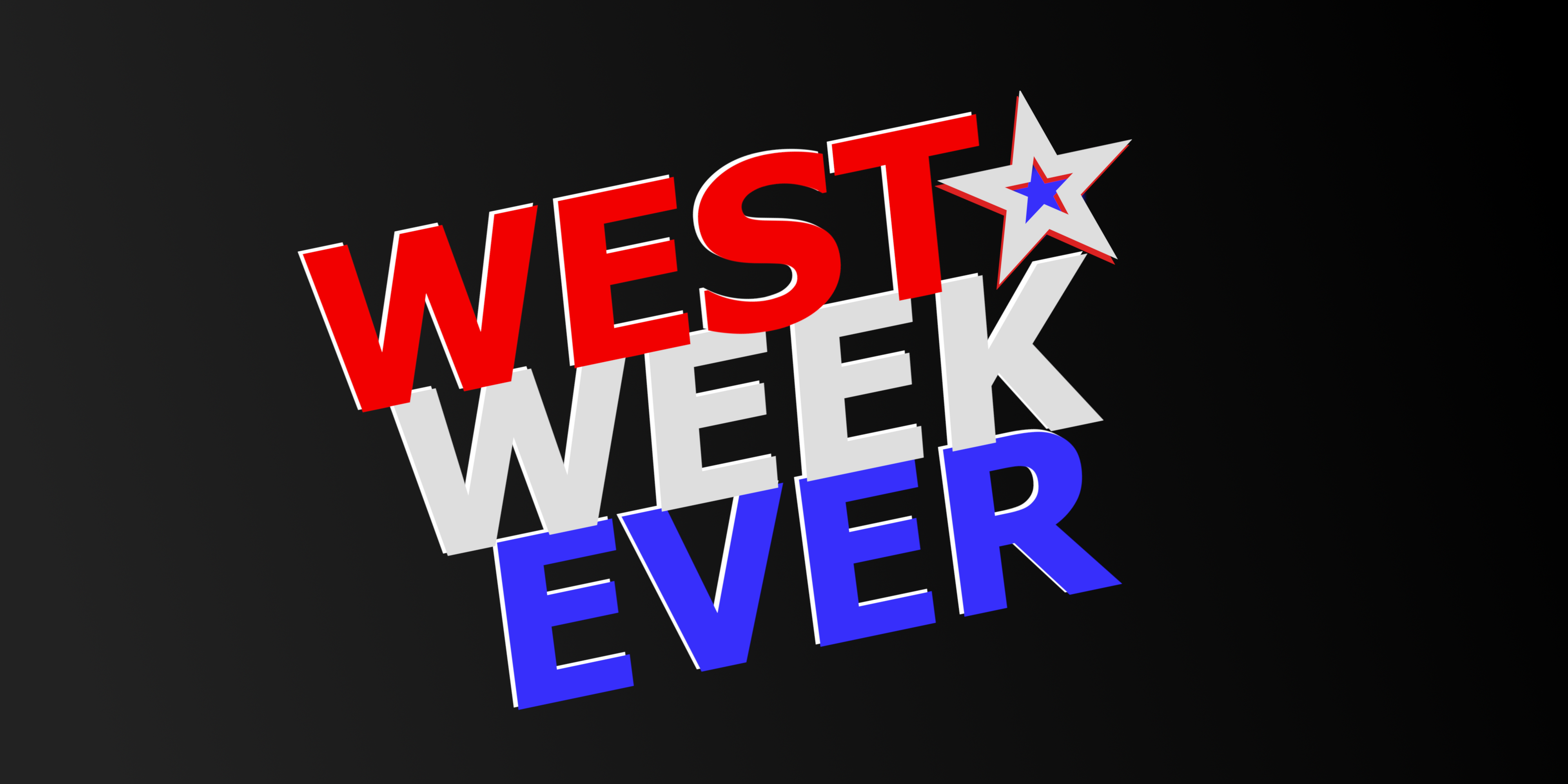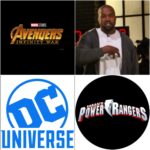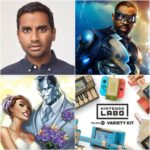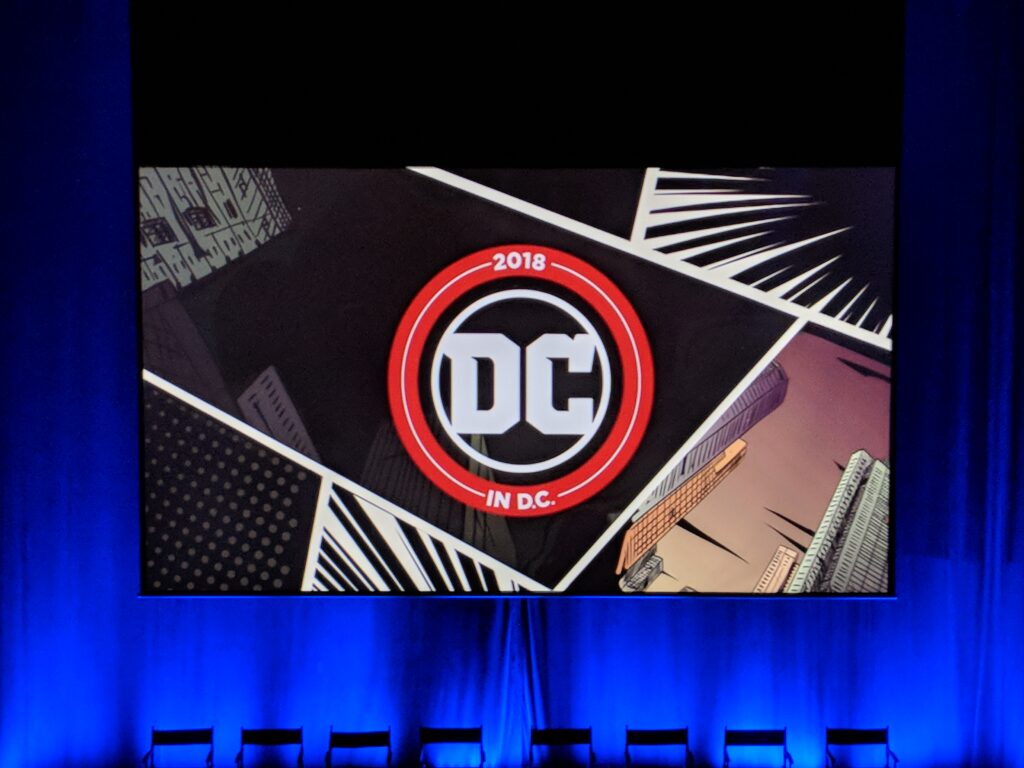
Previously on DC in DC 2018, I discussed all the obstacles I endured just to get into the event, but I didn’t really discuss the event itself. As I had mentioned, the real meat of the 2-day event was the slate of discussion panels that were lined up for Saturday. These panels were not only informative and entertaining, but as you sat there listening to the panelists, the true meaning of the event finally began to click: REPRESENTATION. The whole thing was a celebration of representation of the diverse characters and viewpoints in DC Entertainment. THIS is why it took place over MLK weekend. It wasn’t just that they were debuting a new series starring a Black hero, but it was also that, in their various media, they were striving to create a world like the one Dr. King always envisioned. Marvel seems to get the credit for trying to add more women and minority characters, but they’re always met with backlash from old school fans who don’t like change. And in those cases, it feels more like it’s the individual writer who wants to do it, rather than a mandate from editorial. DC, on the other hand, was here to essentially say that, as a company, it was committed to the representation of all. It was something of a bold step for a legacy publisher who’s commonly seen as looking backward instead forward.
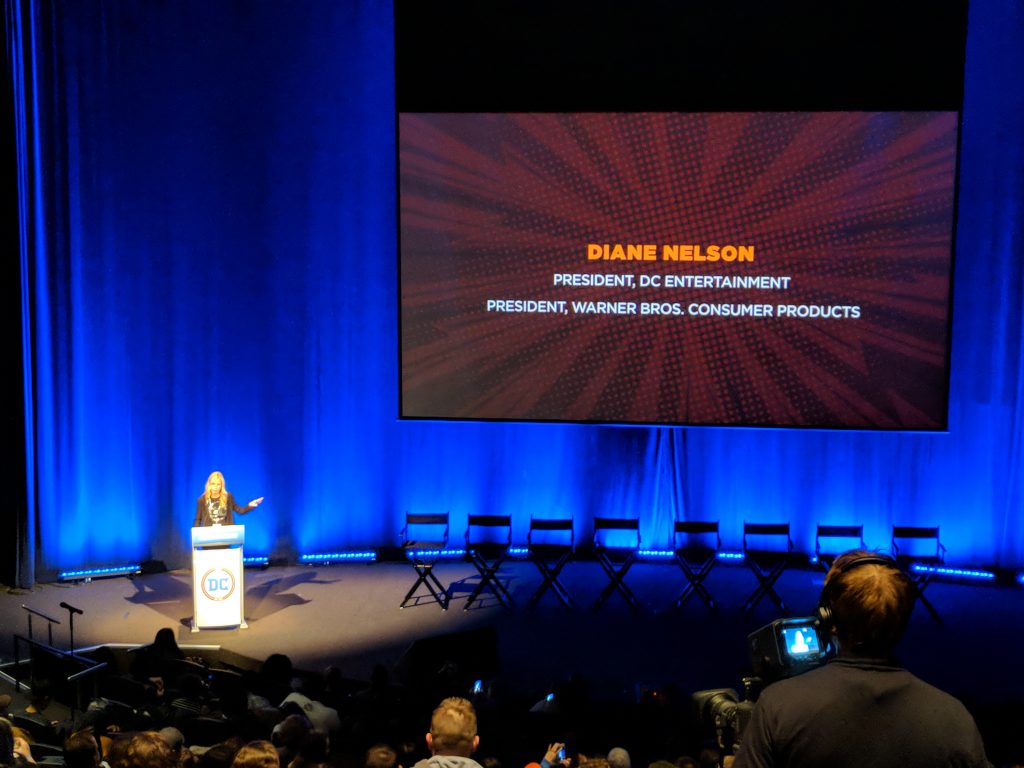
The morning kicked off with a surprise appearance by DC Entertainment President, Diane Nelson. After a somewhat awkward trivia contest, she addressed the crowd in an attempt to explain the purpose of the weekend. While her brief remarks were scripted, the message still didn’t come across as coherently as it could have. It felt as vague as what had been in the press release. Remember? “’DC in D.C.,’ a landmark pop culture event that brings together the worlds of entertainment and public service to illuminate the story of America and current issues through the lens of comics and Super Heroes.” She basically said that. Once she was done, they quickly got the stage ready for the first panel.
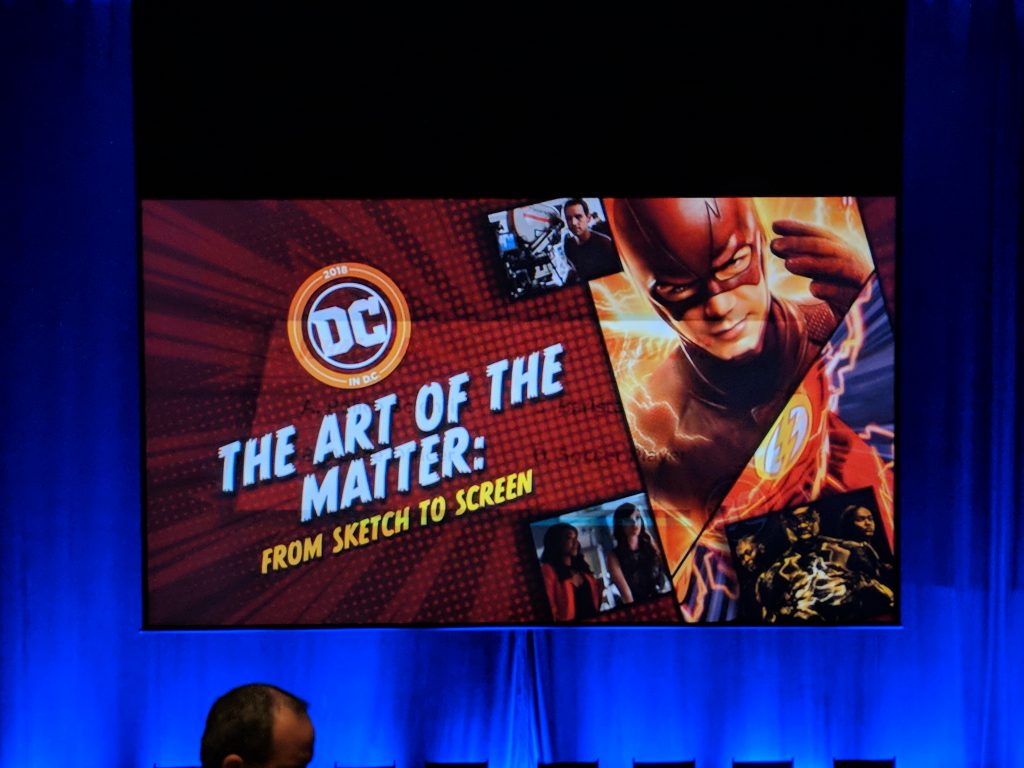
The Art of the Matter: From Sketch to Screen
Moderator: Brian Truitt, writer USA Today
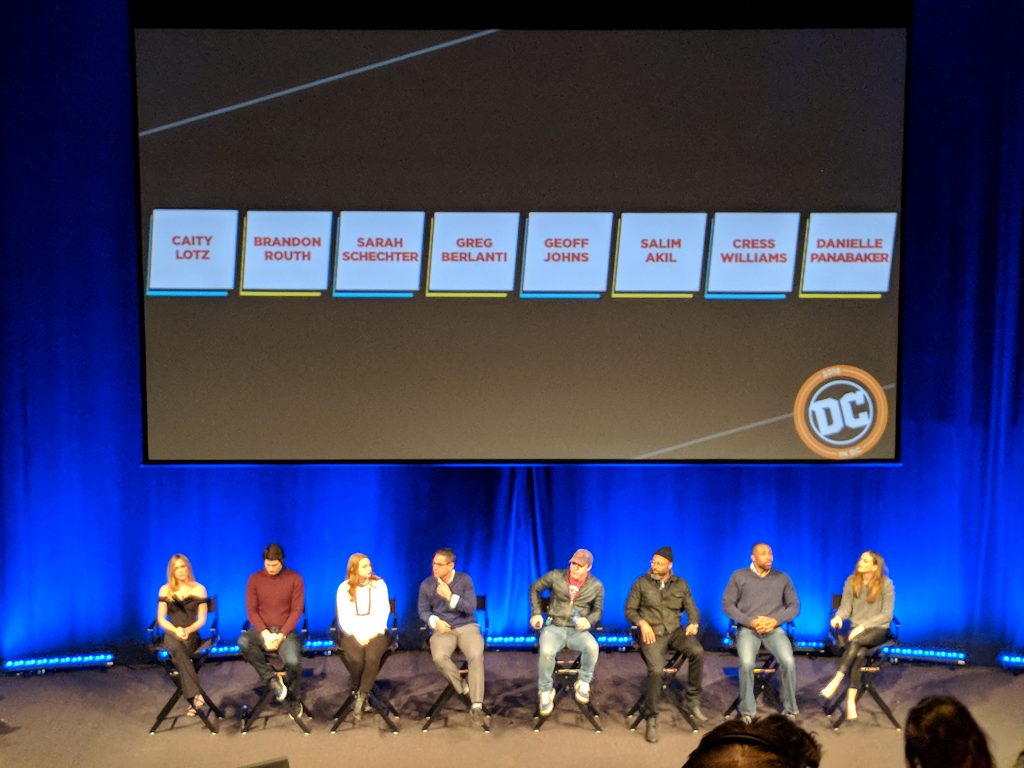
Panelists: Caity Lotz (actor, Legends of Tomorrow), Brandon Routh (actor, Legends of Tomorrow), Sarah Schechter (executive producer, Supergirl, The Flash, Arrow, Legends of Tomorrow, and Titans), Greg Berlanti (executive producer, Supergirl, The Flash, Arrow, Legends of Tomorrow, Black Lightning and Titans), Geoff Johns (President and Chief Creative Officer of DC Comics), Salim Akil (executive producer/showrunner, Black Lightning), Cress Williams (actor, Black Lightning), Danielle Panabaker (actor, The Flash)
The purpose of this panel was to discuss the ways in which the original DC characters are adapted into live action media, specifically television (I should point out that DC had a case of amnesia regarding their movies, as there were no movies clips in their presentation reels, nor any mention of the films throughout the event except during the Wonder Women panel). Some characters are a natural transition, while others are changed to more reflect the world around us.
Berlanti mentioned how the first five seasons of Arrow were basically the origin story of the island. Had it been a movie, that would’ve been a fifteen minute segment. So, he feels that television is a medium where you can showcase longer, richer storytelling.
Johns emphasized the need to be authentic and lean into the super aspects of these characters. He said that you need to embrace it and celebrate it rather than be ashamed of it. He told a story of an article he read as a child about the 90s The Flash TV series, starring John Wesley Shipp. Apparently a studio executive asked why he needed to be in a costume. “Couldn’t he just wear a gray jogging suit?” That’s why Johns insisted on the Grodd cage in The Flash early on. He wanted to give the audience a feel for what they were in for with this show.
Lotz said that we need heroes with everything going on right now, and that we need to be heroes. We all know what she’s talking about, but she wouldn’t pull the trigger and I know the WB execs’ anuses were clenched during those few minutes.
Williams does a great Bill Woodson impression, saying that he would wake up on Saturday mornings to tune in to “Meanwhile, at the Hall of Justice…”
Akil says he’s probably the “angriest Black man in Hollywood”, and that he’s a very sensitive person, so the state of the world affects him every day. He said he can’t help but put it in his work because he feels blessed by the opportunity that’s been presented to him. He simply feels an obligation to put that all in his work.
Berlanti related to Akil, in saying that he’s an out gay man, so it colors everything that he does. He talked about deciding to make the character Mr. Terrific gay on Arrow, who isn’t gay in comics. He jokingly said that when he first heard the name “Mr. Terrific”, he said “That’s a WONDERFUL name for a gay man!” He, then, discussed changing existing characters and creating new ones in finding the right balance for representation.
Due to the panel running a bit behind schedule, there were only about two questions asked by audience members, but nothing notable enough that I wrote them down.
In all, it was a really great discussion with some of the stars and creatives behind the hit CW TV shows. That said, considering it was billed as following the transition from sketch to screen, I would’ve liked a bit more comic representation on the panel. Sure, Johns was there, but a couple more writers would have made things interesting. Maybe talk about how the live action portrayal of certain characters may have, then, affected how they were depicted in the comics. It’s a two way street, with the comics as the source material for the live action adaptations, but the comics then experience some “reverb” from the live action. In any case, it was a good start to the day, and laid the groundwork for some of the bigger discussions that would occur as the day went on.
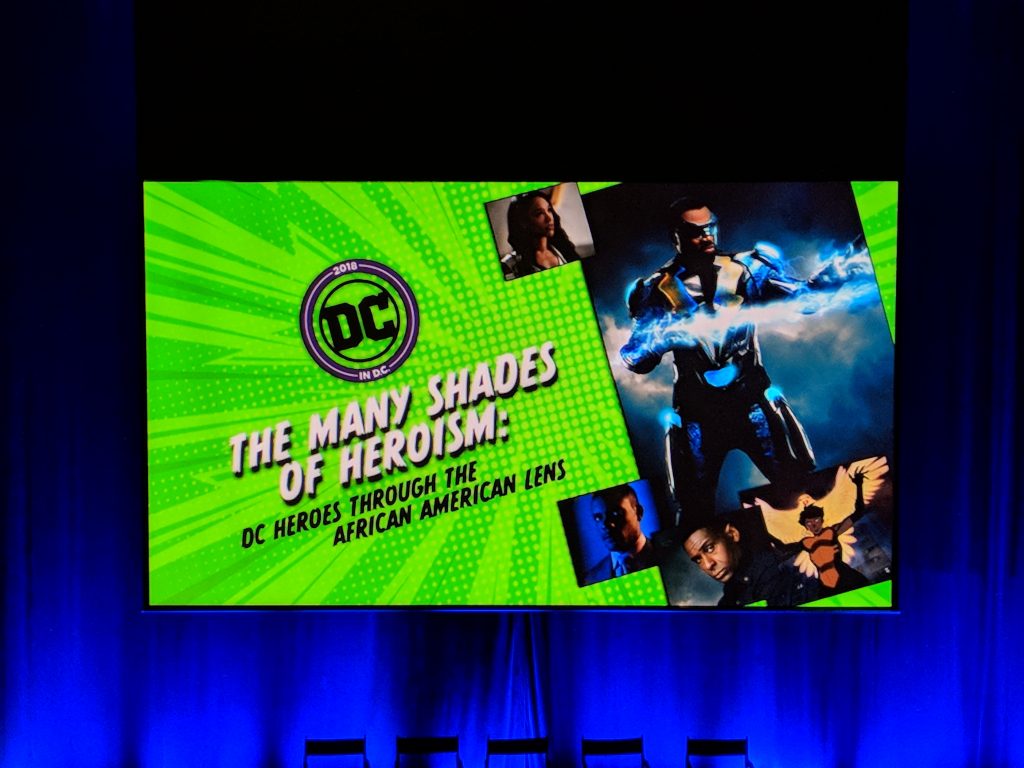
The Many Shades of Heroism: DC Heroes Through the African-American Lens
Moderator: David Betancourt, writer The Washington Post
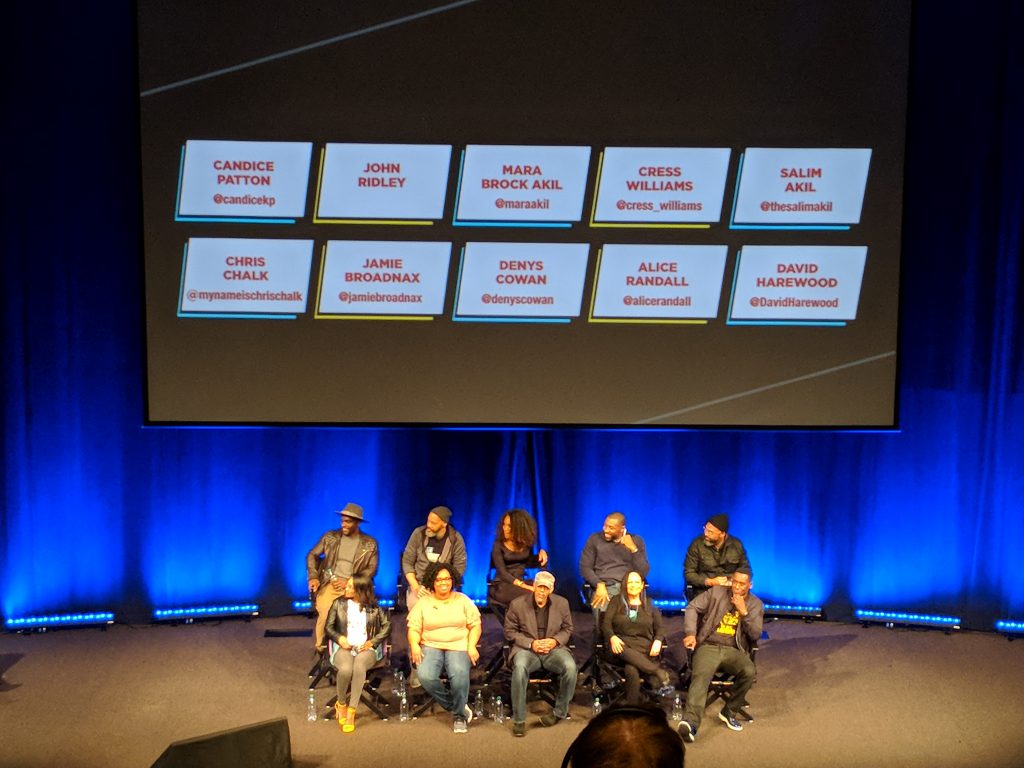
Panelists: Candice Patton (actor, The Flash), John Ridley (executive producer, 12 Years A Slave), Mara Brock Akil (executive producer, Black Lightning), Cress Williams (actor, Black Lightning), Salim Akil (executive producer/showrunner, Black Lightning), Chris Chalk (actor, Gotham), Jamie Broadnax (blogger, founder of Black Girl Nerds), Denys Cowan (co-founder of Milestone Media), Alice Randall (professor, Vanderbilt University), David Harewood (actor, Supergirl)
OK, this is the panel where things really started to click. The panel opened with Williams saying that he desperately wanted to play a superhero, and that the list of possibilities for Black heroes was short. He said he was like, “Well, Luke Cage got taken. Oop, there goes Black Panther.” He actually hadn’t heard of Black Lightning until he read the script.
Salim Akil said that we use the term “authenticity” when we’re talking about the nuance of culture. Black culture is an integral part of American culture. He explained that, in the show, you’ll see what it’s like to be an African-American man in America. However, even if you take the “African-American” off, you’ll still see a MAN who just wants the best for his family and his community. And that’s where the story comes from. Black Lightning is just a dude who wants to do right by those around him. Akil said that’s the kind of man that he aspires to be.
Betancourt mentioned how the casting of Candice Patton as Iris West on The Flash was surely influential in the casting of Kiersey Clemons as the character in the DCEU movies (her scenes were cut from Justice League). Patton said that she was honored, but that at the end of the day these characters exist to make money, and that she’s just glad the powers that be realized there was money to be made with her in that role. She said that there was a consumer base ready for her, and that representation matters. She capped it off by saying that Black women need that platform to feel beautiful and smart.
The day before the panel, it was announced that Ridley would be working on a secret DC project, called The Other History of the DC Universe. Of course it was too early for him to be able to discuss any details about the project. Still, he started by thanking DC and Warner Bros for this experience, as not enough of these events happen anywhere – not just DC. He was glad to know they were treating the Black Lightning premiere with such weight. Discussing his comic The American Way, he discussed a story where Lyndon Johnson felt that if one astronaut was a Black man it would diffuse a lot of conversations that were being had at the time. Ridley said the space program was agitprop against the Russians. He said how, before Obama, you knew a movie was science fiction because they’d cast a Black president. He said it’s amazing to have lived long enough to see Black Lightning presented to everyone as mainstream entertainment. He talked about how he experienced pulling Black Lightning out of his comic bag as a young boy, and said this was akin to how some folks never saw Star Wars in a theater. Likewise, they will never know the experience of being that little boy, who now sees that representation on screen.
Cowan said that he wasn’t used to seeing Black superheroes where they weren’t being made fun of (See: Meteor Man). Other than Static Shock, there haven’t been other Black heroes leading shows. Someone mentions Steel. Cowan answered, “I like Shaquille, but…nah.” Cowan credits fellow Milestone Media co-founder Dwayne McDuffie with pointing out how they needed to open up the industry to diverse voices when they were starting Milestone, and that it’s important for a new generation to do that.
Randall was introduced as a professor at Vanderbilt University. She said that the folks on the panel are working in the footsteps of DuBois, “helping to create the text that makes sure our reality is better in the future”. While her role with Milestone 2.0 is unknown, she said she brings Black Girl Magic to the project. She said that you see what isn’t there and then you create it. Milestone is not meant to be racist but rather universal. They’re trying to “make the tent bigger”.
Broadnax explained the importance of social media in giving a voice to fans of color. Black Lightning‘s hashtag is #GetLit. The Black Girl Nerds Twitter presence has empowered folks to pick up a comic book, and provides the power to connect with one another. She says it’s a big deal to see yourself reflected in something in media.
Chalk plays Lucius Fox on Gotham, who’s a younger, less experienced Fox than we’re used to from Morgan Freeman’s portrayal in the Nolan trilogy. H said there’s freedom in his role because it’s an unexplored time in Batman’s life. He called it the “accidental activism” of being a Black character on screen with no powers. He’d never been a part of something like this, as “12 Years A Slave and Underground keep you from sleeping at night because it’s depressing”. He discussed how Lucius is just “a smartass Black dude” and it’s a refreshing role.
Harewood plays Martian Manhunter AND Cyborg Superman on Supergirl. He pointed out that he was the only Black Englishman in the room, and that when he was growing up the only Black heroes who looked like him were American. He said it was amazing to be there, and that being in America with those excellent Black creatives, on that particular weekend, meant the world to him. He discussed how J’onn is a shapeshifter but chooses to be Black. It was struck by the fact that one of the most powerful people on the planet stands with those who fight injustice.
Somewhat surprisingly, the first question came from a young White woman, who asked how much race will be a factor in Black Lightning since it’s subtle in The Flash. She also asked Patton if she liked the approach that The Flash took with that, or did she wish things were discussed more head on. Patton said that she and costar Jesse Martin have discussed it and that it’s tricky. She said she would need Black writers to handle that carefully. She added that she wonders what it was like for Barry to grow up in a Black family. Said he can probably dance and probably loves her fried chicken (crowd laughed). In the end, she said the race stuff is hard for a show like The Flash, because it’s Barry’s story, which makes her even more excited for Black Lightning.
Next up, a young Black woman said she’s thankful to see Williams representing a powered Black hero. She just wanted to thank them all for being there.
It was a great panel. It was a powerful panel. Betancourt employed an efficient style to keep the panel on schedule, where he really only gave each panelist one shot at having their say. They all said some variation of “Representation matters, and this is what I’m doing to contribute to it”.
I will say, however, that DC kinda stacked the deck with this panel. I mean, everyone was at the event to support the debut of Black Lightning, based on DC’s first Black hero to star in his own ongoing comic title. The panel was comprised of Black creatives who discussed what the character and representation meant to them. Patton even mentioned how she would need Black writers to carefully handle nuanced storylines about race. Well, here’s where it gets tricky: Black Lightning was created by Tony Isabella, a White man – one, might I add, who’s still alive. Now, most minority characters were created by White men “back in the day”, so this is nothing new. It was odd, though, how they never even mentioned him for the sake of the narrative. As far as we were concerned, Black Lightning was a Black hero of nebulous origins, being brought to the small screen oozing with Blackness courtesy of the creative team behind Girlfriends and The Game. They were treating Black Lightning like a wrestler from “Parts Unknown”. While the panel was exploring heroism through the “African American lens”, I think it would’ve been interesting to have heard Isabella’s motivation for creating the character, as well as where he drew inspiration for the character. To me, his absence was suspect. At first I thought maybe he had a prior engagement. Then, later that night as I was searching the event hashtags on social media, he was present at the Smithsonian premiere party! So, it gives the feeling that DC “kept him under wraps” so as not to undermine the Blackness of what they were there to celebrate. Just my two cents on that one.
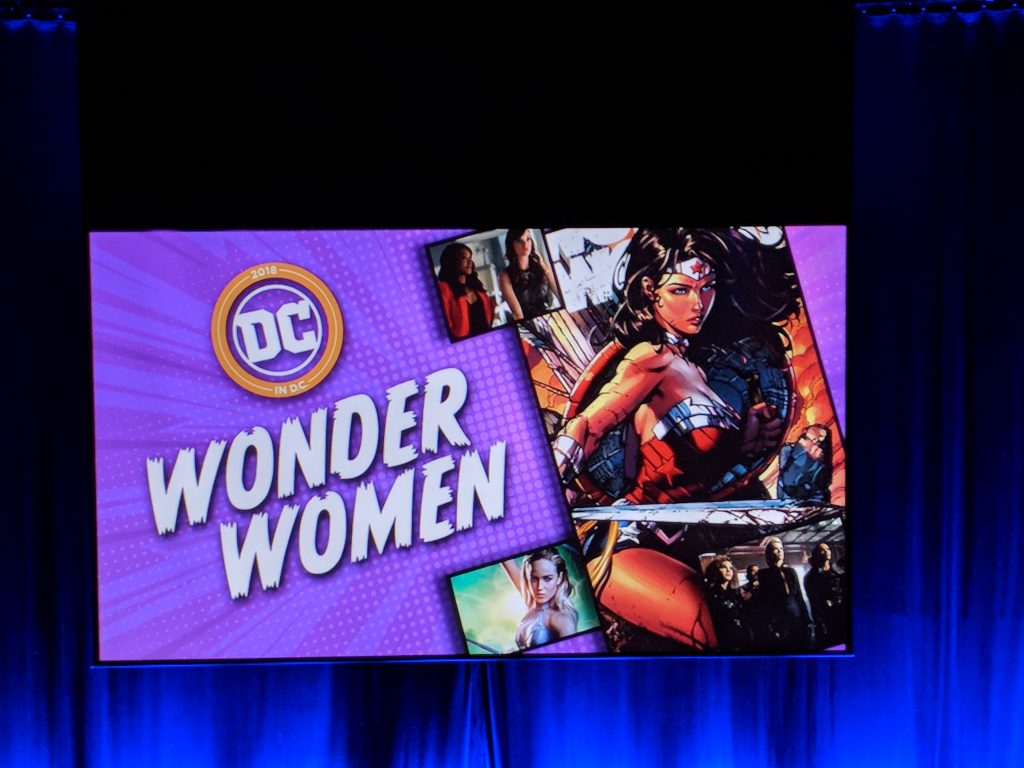
Wonder Women
Moderator: ? I kinda got involved in Twitter when they announced her name, and the audio went out at this point on the livestream, so it seems a lot of folks don’t know her name. I believe she’s an E! News correspondent? She mentioned she had just flown in from LA…
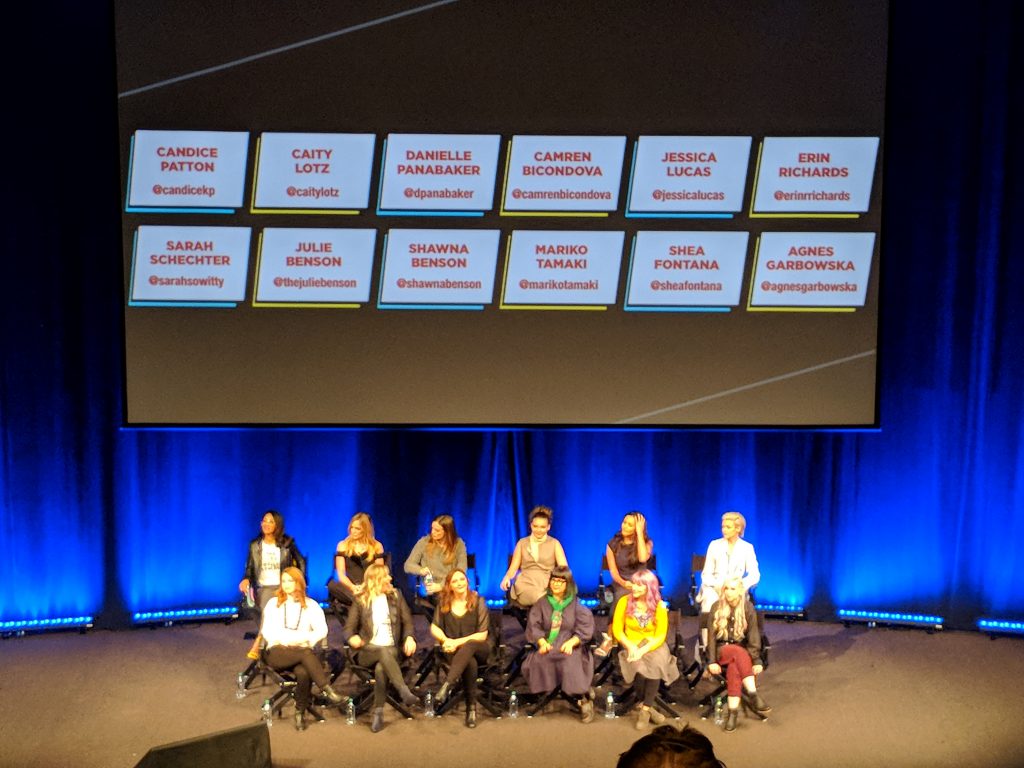
Panelists: Candice Patton (actor, The Flash), Caity Lotz (actor, Legends of Tomorrow), Danielle Panabaker (actor, The Flash), Camren Bicondonva (actor, Gotham), Jessica Lucas (actor, Gotham), Erin Richards (actor, Gotham), Sarah Schechter (executive producer, Supergirl, The Flash, Arrow, Legends of Tomorrow, and Titans), Julie Benson (comic writer, Batgirl and the Birds of Prey), Shawna Benson (comic writer, Batgirl and the Birds of Prey), Mariko Tamaki (comic writer, Supergirl: Being Super), Shea Fontana (comic writer, DC Super Hero Girls), Agnes Garbowska (comic artist, DC Super Hero Girls)
This was an interesting panel from the start because it was apparent that the moderate was out of her comfort zone. Unlike Truitt and Betancourt who clearly had a familiarity with the industry and the source material, this woman really didn’t know much at all. My friend and I joked that if she had ever even read it a comic book, it’s because E! gave her one to read on the plane out here. Plus, she introduced each woman by complimenting something about their appearance, be it their shoes, clothes, or hair. she was basically pulling a red carpet “Who are you wearing?” at a panel about women’s empowerment. Yay, feminism? While she was engaging and upbeat, she didn’t know what she was getting herself into. I bet she originally felt it would be something of a fluff piece, where they would drool over how cool the Wonder Woman film was, but she was met with a panel of strong, opinionated women who weren’t there for that. In fact, my friend pointed out that there was a point midway through the panel where it became apparent that Schechter had essentially taken over the moderator job, as the panelists began to look to her before answering the moderator’s questions.
The panel started out by stating that 53% of comic readers are women, though you wouldn’t know it by their lack of strong representation in the books. The moderator asked if this increased readership for women was the result of the success of the Wonder Woman film, but the panel quickly corrected her and told her that “women have always been here”. For the first half of things, the questions were fairly comics-centric, which led the TV stars to be pretty silent on the panel. We learned that the Bensons grew up reading their father’s Silver Age comics, so they’ve been lifelong fans. The moderator asked the comics professionals how they did their best without alienating fans. It was a softball that felt like that Barbie doll that used to say “Math is hard”. Tamaki replied, saying that if the fans don’t like the new stuff, there’s always the retro stories for them to fall back on. Otherwise, you can’t let that fear hold you back.
Next, the moderator asked everyone how they felt after seeing Wonder Woman, and also asked if they felt we might be “hanging our hat” too much on the film’s popularity. The panel disagreed with that sentiment, with Lotz explaining how she felt leaving the theater. She said she looked around, saying “I could crush YOU, and I could crush YOU!” She said it felt amazing and that it must be how men felt all the time.
Lucas discussed how she originally felt some sort of pressure to make her Gotham character more likable, but then realized that there was freedom in that, and that the character was still representation for somebody out there.
Bicondova said that social media is helping folks to become more understanding and interconnected, and that Wonder Woman and the characters that they portray have become more popular because of it.
The moderator then said that a male friend of hers told her that he had a problem taking Wonder Woman seriously. He said that female heroes are more cerebral than strong. Panel disagrees. They say that her friend needs to watch some of their shows. Females can be anything. Bicondova mentioned how when she got the role of Selina Kyle, she got a lot of online backlash about how wrong Gotham got things (Sidenote: She seems very young. Might be her first panel?). She said she gets a lot of questioning about the writing and acting – which is interesting considering that she just a few minutes prior said that she felt social media was causing people to be more understanding. She asked the panel if that’s something see should get used to. They didn’t give her an affirmative answer, but it was clear that their answer was “yes”.
Tamaki said “realism” isn’t something they think about in a medium where you’re making people fly. She said change comes with conflict and that you have to resist.
The moderator, then, asks a very E! question: did the actors feel that the costumes that they wear serve to undermine their strength and feminism. Bicondova said “feminism” is that you can kick butt and wear what you want. Shechter chimed in, and mentioned how they added the skirt to Supergirl’s costume when designing her suit for the show. Lotz said that as long as she’s not a plot device to move the male character along, she doesn’t care what she’s wearing. Women are more than what they wear.
Patton added that what matters is the fact that women are the heroes of their own stories. Women are making choices now, which makes folks uncomfortable because that’s not the “feminine way”. She said women are now stepping up and saying, “Thanks for your input, but I decide”.
The Gotham actors brought up a scene where they were supposed to torture someone while in their underwear. An executive called the actors and asked how they felt about it, but were fine with them saying no. They emphasized that Warner Bros is a supportive environment, and that it’s important to have that second voice/other women in the costume fitting, in the writers room, etc. Shechter added that the best part of working in TV is the continued collaboration with the actor, as the actors grow into their roles and know them better than anyone else.
As for the comics, the Bensons mentioned they’ve asked for clothes to be functional when talking to artists for Batgirl and the Birds of Prey. They ask for cleavage to be toned down, etc. The comics pros discussed the Power Girl “boob window”, and how it has meaning because it undermines the strength of a woman as she’s doing kick-ass things. When designing DC Super Hero Girls, all the girls wear flats because fighting in heels makes no sense.
Patton then mentioned that she agreed with the last panel in that her role as Iris is “accidental activism”. She got into it to pay her rent but now she’s become a voice for girls who look like her. She said her heroes were White and blonde but it felt outside of herself (Lotz, sitting next to her as a blonde White woman, began flipping her hair. The crowd got a good laugh out of that). Patton she would never get those parts but would end up the best friend of the Pretty White Girl. She said that, for the first time, she IS the Pretty White Girl. The moderator (herself a Black woman) was quick to correct her by saying,”Well, pretty Brown girl”, which kinda knocked the wind out of the sails of what Patton had just conveyed. Schechter jumped in, adding that the hashtah she sees on Twitter is #keepirisblack, and that comes back to the need for representation.
The moderator, then, asked if they have they seen a more inclusive nature in Hollywood? Schechter said she still sees a lot of problems with wage inequality. What’s first step in correcting it? Lotz said that if folks on other side of the table don’t value you, they’ll just move on to the next woman. Negotiators have to value women as much as women value themselves. Schechter said it’s about breaking precedent. Lotz and Patton live together and have open discussions about pay. They said they can’t fight the fight without their male comrades, and that they need to be transparent about their pay, too. They said it’s about those with power lifting up those without. Panebaker added that the Time’s Up movement is important because it’s about coming together.
Standing up for her employer, Schechter ended the discussion portion by saying that Warner Bros and DC have an emphasis on equality, and that the good people have to be applauded, too.
Q&A
A little girl dressed as Wonder Woman asked “If you could have a superhero what would it be?” Based on her age, it wasn’t really clear, so they interpreted it as “If you could have a superpower what would it be?”The popular answer from most of the panel: fly, because LA traffic sucks.
A woman pointed out that to Patton that Iris isn’t scientific amongt all of these scientists, and asked how important is it to her that she’s a Black, non powered character who’s just as important as the heroes? Patton answered that she thinks it’s important in all hero stories to have characters who aren’t heroes. She doesn’t have to be a super scientist to have value. Iris has tremendous power and value.
Another young woman asked if there will be a chance for Lotz and Patton to work together since it was recently reported that Wally West would be appearing on Legends of Tomorrow. Either this was news to the panel, or they weren’t at liberty to say anything, but they didn’t seem too optimistic about the prospect.
A visibly nervous young woman asked “How does facing women’s issues inform your portrayal of your characters? Conversely how does your portrayal empower you in real life?” Richards responded that women are typically very supportive of each other and feels panels like these help her to reach out to other women that she’s representing them. Bicondova said she’s shy and introverted and feels Selina is the same but also manages to stand her ground. So Selina is her inspiration in faking confidence. She pointed out that we sometimes have to fake confidence to face certain situations.
The next woman mentioned the “Trial of The Flash” trailer. She noted that there’s so much power in Patton and Panebaker’s characters right now, so she wanted to know how that felt for them. They answered that the shows are lucky to have incredible casts, so it doesn’t always have to be a focus on the hero, but can focus on the supporting cast for them to have their moments as well.
Another woman asked Lotz “What was the process like getting into the head of Sara Lance?” She responded that Sara’s a bit if a tortured soul so it was a little bit of a dark time. She said she’s talked to a lot of fans who felt the same: irredeemable and guilty for what she’s done. When she gets past it, even if just a little bit, it’s powerful. She slips back and forth as it’s a constant work in progress, like it is with most people.
A woman who might have been of Middle Eastern descent thanked Lotz for the character of Zari that was added to Legends of Tomorrow this season. Lotz responded that Zari’s a terrific actress and a great human. The woman, then, asked “How does the atmosphere onset change when they get to team up instead of being only woman in the room?” There was a sigh of relief from panel. Lotz said they came together to run the set and to keep things moving, which was really empowering. She said that when you have someone in your corner, that IS power.
A teenage girl asked “What is Shethority?” This referred to the female empowerment brand that was established by the women of the DCTV universe. Lotz said they started getting together during the crossover and realized how important it was to have each other’s backs. They wanted to create a place that gave folks a sense of community and a place from which to pull strength. It’s a place to share stories, lift each other up, and share collective power.
There was a lone male who went up for a question on the other side of the auditorium. Because the line was longer on the opposite side, the moderator kept passing him over because those women had been waiting longer than he had. I thought he was going to give up, but he was persistent and patient, and I’m glad he was. He said that he was a father to a young girl, who has strong female role model in the form of her mother. Thanks to the panel, he said she’ll have even more strong role models. He asked if they had any advice for a dad who wants to raise a Wonder Woman? Someone said “Believe in her”, and that knowing enough to ask his question shows he’s on the right path. Lotz said he should challenge her and not assign typical gender roles. “Give her the confidence of a white man.” Bicondova seemed to get a bit choked up with her answer, saying she thinks dads are held to impossible standards (they shouldn’t cry, they have to be strong, etc), and as a girl she very much looked up to her dad. She said “It’s good to have your hero stand next to you just as well as above you. Let her know she can talk to you.”
For the final question, a woman asked Patton and Panebaker, “How do you include a strong, sexy vibe into your character without submitting to the male gaze?” They said “Strength and confidence.” Patton perfectly ended the panel, saying, “Sometimes I just tell them ‘That camera better not be on my butt!'”
While I missed the afternoon panels, from what I was able to see, I’d say Wonder Women was the most powerful in its interaction with the audience, as well as for what it meant to those in attendance. While the same might’ve been said about the Many Shades of Heroism panel, the lack of a real Q&A period didn’t allow the audience to really share in the experience with the panelists. This panel was packed with strong women who didn’t come for a fluff panel, in spite of a moderator who constantly tried to make it entertaining rather than informative. I feel it was empowering to an audience of women who appreciated the representation these women provided, and in many ways was probably inspirational to a few of them. When the Q&A portion occurred, there were several who clearly weren’t comfortable speaking in public, yet they struggled and succeeded in finding their voice to get their questions out to the panel.
What easily could’ve been a “Wow, wasn’t Wonder Woman so cool?!” panel turned into a very informative hour about gender pay equity, advocating on your own behalf, and the power of strength in numbers. It was when this panel ended that I thought, “Oh, I get it now” in terms of the purpose of the weekend. While DC and Warner Bros didn’t effectively convey it in the publicity and the marketing, this panel is what the weekend was all about: the fact that WB/DC have not only acknowledged the need for representation of various backgrounds and viewpoints, but also went the next step in bringing that representation to meet with the very people they were representing. With that in mind, I’d say that, despite any organization hiccups or seeming lack of preparation, the weekend was a success in that it achieved its goal. I believe everyone in that auditorium not only enjoyed the event, but also left feeling better for having been in attendance. DC has been saying that this is the first event of its kind, so I’m sure its success (or lack there of) will decide if there are any future events of this nature. I truly hope there is a “next time” because, once they iron out some of the kinks, they could have quite the enjoyable and empowering fan experience on their hands.
DC livestreamed the event on YouTube if you want to see the panels for yourself.
Anyway, that concludes my reporting on #DCinDC2018. Thanks for joining me this week, and be sure to come back tomorrow for my recap of the week’s big pop culture topics in West Week Ever!
